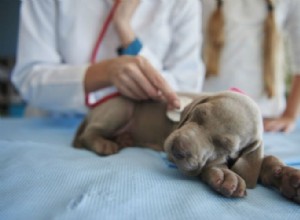子犬の世話には、毛づくろいや餌を与えるだけではありません。お子様の最適な健康状態を確保するために、定期的に愛犬の駆虫を受ける必要もあります。 腸内寄生虫がないことを確認します。
ペット保険で子犬を守る
一般的な子犬の寄生虫について学ぶ
ワームは、子犬の病気の最も一般的な原因の 1 つです。 、注意すべき兆候を知り、子犬の駆虫スケジュールを確立することは非常に重要です.この投稿では、どの寄生虫が駆虫薬を必要とするのか、どのようなリスクがあるのか、子犬が健康で幸せに成長できるように駆虫スケジュールを開始する時期について説明します.
子犬の駆虫について知っておくべきことは次のとおりです。
駆虫とは、子犬から寄生虫を追い出すことです 経口または注射で薬を投与することによって。ワームは、胃腸の問題を引き起こす可能性のある寄生虫です。 駆虫されていない子犬は病気になり、発育不良、栄養失調、胃腸の不調に苦しむ可能性があります — そのため、定期的に子犬の駆虫を行うことが重要です。
子犬は一般に、次のようなさまざまなソースから寄生虫に感染します:
子犬によく見られる寄生虫には主に次の 4 つのグループがあります。回虫、サナダムシ、鉤虫、鞭虫です。 .

回虫は 4 ~ 6 インチで成長します 経胎盤的に、つまり出生前に母親の胎盤を通して移すことができます。子犬は、母親の母乳に含まれる卵から授乳中に回虫に感染することもあります.治療を行わない場合、子犬の回虫の最も一般的な結果の 1 つは、発育不全です。 人間の宿主に感染する可能性があります。
犬のサナダムシは、最大 11 インチの長さに達することがあります 、またはほぼ 1 フィートのサイズです。犬がうっかり寄生したノミを食べてしまうと伝染します。感染すると、寄生虫は小腸で急速に増殖し、胃腸 (GI) の問題や、子犬の糞や肛門の周囲に見られる寄生虫につながります。 .
子犬の成長と栄養摂取に非常に有害な場合がありますが、成犬にはほとんどリスクをもたらしません。ただし、重度のサナダムシ感染症が人間に感染する可能性があります ので、長くて平らなテープのように見えるワームに気づいたら、すぐに行動してください。
鞭虫は成熟時に約 1/4 インチまでしか成長しません 、しかし、サイズが小さいにもかかわらず、他の腸内寄生虫よりも多くの感染症を引き起こすことが知られています — 特に、免疫システムが弱まっている子犬、高齢者、および犬の間で.多くの場合、感染が深刻になるまで、子犬の寄生虫の顕著な症状はありません 、それらが存在する結腸と盲腸に重大な刺激を引き起こします。これは、血便を伴う下痢として現れる場合があり、結腸が損なわれたり、失血による貧血につながる可能性があります .
犬は、糞便で汚染された草、土、または同様の表面にある幼虫を飲み込むことで感染します。 鞭虫は伝染性が高い 子犬の糞の中の小さな虫を検出するのは困難であり、丈夫な卵は最大 5 年間生き残ることができるためです。 適切な環境が与えられました。幸いなことに、人間に伝染することはありません (私たちには独自のタイプの感染性鞭虫種があるため)。
犬の鉤虫は、若い子犬にとって深刻な脅威です。それらは、消化管に向かい、小腸の壁にとどまる前に、母親に追い越されたり、環境で拾われたりする可能性があります.そこで、彼らは宿主の血液を食べ、一匹のワームで最大 0.1 mL を排出します。 .このような急速な失血は、子犬の貧血の重篤で致命的なケースを引き起こす可能性があります 、および慢性的な鉄欠乏 .
感染したすべての子犬が寄生虫感染の明白な症状を示すわけではありません 、一貫した駆虫スケジュールに従っていることは、ライフサイクルのそれぞれで寄生虫を駆除するために不可欠です.寄生虫の症状がある子犬のうち、最も一般的な臨床症状には次のものがあります:
これらの症状の多くは、他の健康問題を示している可能性があります 子犬のパルボのように (糞の中のワームを除く)、危険信号に気付いた場合は常に獣医師に相談する必要があります.
子犬によく見られる多くのワームは人獣共通感染症です 、動物と人の間で伝染することを意味します .子犬が寄生虫を持っていて、それをあなたに移した場合、下痢、腸の痛み、および呼吸器、消化器、または心臓血管系の二次的な健康問題を引き起こす可能性があります. 特定の人々は、伝染性のある子犬による感染のリスクが他の人々よりも高い 、具体的には:子供、高齢者、妊婦、糖尿病患者、がん患者、および免疫システムが低下しているすべての人。
回虫、サナダムシ、鉤虫など、子犬から感染する可能性のある寄生虫に加えて、注意が必要な他の人獣共通感染症の子犬寄生虫があります (マダニによって引き起こされる犬のライム病や、犬のジアルジアによるジアルジア症など)。 /P>
幸いなことに、獣医師が推奨する駆虫スケジュール、子犬のワクチン、寄生虫の予防薬に従うことで、ペットと人獣共通感染症を共有することを避けることができます.
子犬は生後 8 週になるまでは 2 週間ごとに駆虫し、その後は生後 6 か月で再度駆虫します。 At that point, you can switch to an adult deworming schedule for dogs, which typically consists of a worming treatment every 6 months .
However, you should onsider using a preventative therapy to defend your pet from an infestation, as parasites have high rates of re-infection after entering the bloodstream. It's best to begin a worming treatment before eggs laid by transplacental parasites pass through the stool. Therefore, most vets recommend starting a puppy deworming schedule as early as 2 weeks-old .
A typical puppy deworming schedule is administered by a veterinarian at 2, 4, 6, and 8 weeks of age, then again near the 6-month mark. Adult canines do not need to be on a deworming schedule if they take medication to prevent canine heartworm disease plus flea/tick control, but vets recommend an annual fecal test to confirm there are no worms present in the stool to be safe.

Deworming treatments are easy and effective to use. The typical treatment protocol is for a veterinarian to provide or supervise the puppy wormer administration for 1-3 days and then repeat in 2-3 weeks . The repeated dosing is used to kill the parasites that were still larvae or eggs during the first treatment but have since developed into adults.
Be sure to speak to your veterinarian for a puppy wormer prescription; it is not recommended to buy over-the-counter wormers due to inefficient active ingredients and improper dosages . During your first vet visit, the veterinarian should examine your puppy's poop for the presence of worms and determine how much wormer to prescribe and on what schedule.
There are many different ways to give your puppy a deworming treatment. Broad-spectrum formulas are available by prescription as well as over-the-counter, though they are not recommended. Dewormer can be administered as oral medication (chewable dog treats, pills, liquid, pastes, and food additives) or injectable shot administered by a licensed veterinarian .
No. You need a vet's help in determining whether your puppy does indeed have worms and identifying what kind of parasite they are. Without this information, it is not possible to choose the correct medication to deworm your puppy at home.
After deworming, you might notice dead worms in puppy poop . Sometimes, you might notice slight movement but the worms will go on to die. You should also expect your puppy to experience some diarrhea after treatment.
Puppies with high worm burdens might become ill after deworming . This is because when all of the parasites die at once, the lining of the intestines becomes inflamed, causing vomiting, diarrhea, and decreased appetite. Luckily, this usually resolves on its own and your puppy should feel fine in a couple of days.
It’s important to understand that these treatments won’t prevent your puppy from contracting worms; they work by killing internal parasites that are already present in your puppy at the time of administration. To effectively maintain your pet’s health, you should follow a consistent puppy deworming schedule.
In general, anti-parasite drugs have a very high margin of safety , which means that they rarely cause problems. Of course, you should always make sure to follow your vet’s recommendations when it comes to the type of dewormer and dosage.
Puppies will typically poop worms for 2-3 days after a deworming treatment . However, you might still find some worms in your puppy's stool up to a week after they’ve been dewormed. This is perfectly normal and you shouldn’t be alarmed.
Typically, multiple rounds of dewormer are required in order to kill the eggs and larvae. The number of rounds and length of treatment differs depending on the parasites (for instance, treatment for roundworm infection typically lasts 4 weeks), as well as the severity and size of the infection .
Some parasites are large enough to see and can be found in the puppy’s stool or around their anus. However, even if you do notice parasites in your puppy’s feces, a veterinarian should still examine a stool sample to determine exactly what parasite your puppy is infected with and which course of treatment will be best.
No, deworming puppies only treats a current parasite infection. Even when your puppy has been fully dewormed, they’re still at risk of becoming infected again . The best way to protect your pet from future infection is to have them on a regular heartworm/flea/tick preventative that also controls common intestinal worms.
While intestinal worms are typically not fatal, they can be a big nuisance. If left untreated, they can result in coat issues, lack of appetite, poor nutrient uptake, poor growth, intestinal upsets, organ damage, loss of consciousness, and even death . For this reason, it is very important to treat your puppy regularly for worms.
A basic vet visit costs averages around $50-$75 , while the cost of a fecal exam and puppy dewormer ranges from $50-$150 depending on the type of parasite, severity of infection, and the medication used. Hospitalization (if required) is not cheap, costing anywhere from $500-$1,500 in some cases.
If your puppy has heartworms, your veterinarian will need to do bloodwork, X-rays, and other tests to determine how serious the infection is. These diagnostic tests alone can cost $1,000 or more .
Pet insurance can cover expensive veterinary treatments your pet might require throughout its life, and some plans include deworming. Many companies also offer pet wellness plans to help offset preventive pet care expenses, including the cost of vaccines for dogs, annual wellness exams, and standard fecal tests.
Pawlicy Advisor can recommend the best pet insurance plan for your puppy based on its unique information. The platform also helps you compare plans from top pet insurance companies side-by-side, so you can understand coverage details and enroll in your favorite solution within a matter of minutes. Click the button below to get started.
Protect Your Puppy With Pet Insurance
Is Pet Insurance Worth It?

子犬は免疫システムが完全に発達していないため、多くの病気にかかりやすくなっています。 1 つの例は、腸を攻撃して重度の下痢、嘔吐、脱水症状を引き起こす厄介なウイルス、パルボです。パルボは非常に伝染性が高く、予防接種を受けていない生後 6 か月未満の子犬にとっては特に危険です。 このガイドでは、最も一般的なパルボの症状や、致命的な可能性のあるこの病気からペットを守るための手順など、子犬のパルボについて知っておくべきことをすべて説明します. プロのヒント :子犬がすべての定期予防接種を受けていれば、ペット保険がパルボに適用されます。子犬が健康上の合併症を発症する前に登録することをお勧めしま

Petfinder は、家を必要とする動物のオンライン データベースです。このデータベースには、米国、カナダ、メキシコにまたがる約 11,000 のアニマル シェルターのディレクトリも含まれており、ペットの親が自分の地域でペットを簡単に見つけ、採用し、育てることができます。 20 年以上にわたり、Petfinder は 2,500 万を超える犬、猫、鳥、小動物、馬、家畜が養子縁組を通じて家を見つけるのを支援してきました。 Petfinder の使用に興味がありますか?スピードアップしましょう。 レスキューを家に持ち帰りたい場合でも、ペットを引き取ってもらいたい場合でも、次のことがす